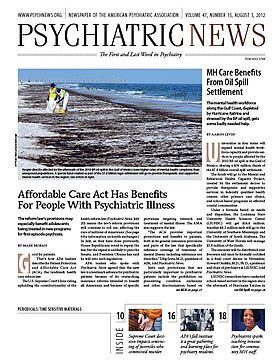Being born prematurely is associated with increased risk of a range of severe mental disorders in adulthood, including nonaffective psychosis, depressive disorder, and bipolar disorder. And that association between early birth and later psychiatric illness persists, even after adjusting for maternal sociodemo-graphic characteristics, maternal psychiatric history, and other pregnancy outcomes previously associated with psychiatric disorders, such as nonoptimal fetal growth and Apgar score.
These findings by researchers from King’s College London and the Karolinska Institute in Stockholm, Sweden, are detailed in the June Archives of General Psychiatry.
Lead author Chiara Nosarti, Ph.D., senior lecturer in mental health studies and neuroimaging in the Department of Psychosis Studies in the Institute of Psychiatry at King’s College, and colleagues set out to determine the specificity of the association between perinatal complications—including premature birth—and neurodevelopmental impairments and psychiatric morbidity later in life.
“Most studies to date have investigated the relationship between prenatal and perinatal complications and schizophrenia,” the researchers noted, “but few have examined the relationship with other adult-onset psychiatric diagnoses.”
They also wanted to discover whether adverse perinatal events are independent risk factors for psychiatric illness or reflect shared etiologic mechanisms. “There is often overlap between these events; thus, most babies who are born with a low birth weight are born preterm, and many also experience varying degrees of intrauterine growth failure, which is often complicated by hypoxia,” wrote the researchers, who also noted that establishing the relationship among all three types of complications, not just in schizophrenia but in other severe mental disorders, would increase our understanding of the etiology of these disorders and may allow the most vulnerable individuals to be identified early in life.
To shed light on that possible relationship, the researchers examined data from the National Board of Health and Welfare in Stockholm and Statistics Sweden, which provided individually linked data in three population-based Swedish registries. Their participants were all individuals registered in the nationwide Swedish Medical Birth Register from 1973 to 1985 and living in Sweden at age 16 by December 2002 (n=1,301,522).
They found that preterm birth was significantly associated with increased risk of psychiatric hospitalization in adulthood. Compared with term births (37 to 41 weeks), those born at 32 to 36 weeks’ gestation were 1.6 times more likely to have nonaffective psychosis, 1.3 times more likely to have major depressive disorder, and 2.7 times more likely to have bipolar affective disorder. Those born prior to 32 weeks gestation were 2.5 times more likely to have nonaffective psychosis, 2.9 times more likely to have depressive disorder, and 7.4 times more likely to have bipolar affective disorder.
“The finding of a significant… association between gestation age and later hospital admission with a range of psychiatric diagnoses suggests that future longitudinal research combining gene-environment information, including gestation age, may represent a useful investigative tool with potential for early identification of individuals who may be particularly vulnerable to develop a variety of psychiatric disorders in late adolescence and young adulthood,” they concluded.
The study was supported by a NARSAD Young Investigator Grant from the Brain and Behavior Research Foundation.


